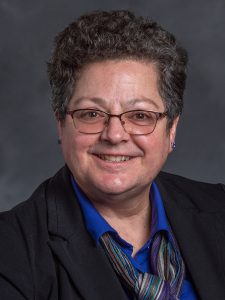
Sieglinde Snapp, 2019-20 AAN Leadership Fellow, 2018 William J. Beal Distinguished Professor Recipient
Sieglinde Snapp is a Professor of Soils and Cropping Systems Ecology in the Department of Plant, Soil and Microbial Sciences and Associate Director of the Center for Global Change and Earth Observations at Michigan State University. She carries out participatory action research and extension in the Semi-Arid Tropics of Africa and temperate rain-fed agroecosystems of the North Central United States, working with MSUE and Michigan farmers. Her highly collaborative approach to sustainable systems science has brought to the world’s attention the inadvertent negative consequences, tradeoffs, and synergies of sole versus diversified cropping, and the urgent need for biologically sound soil and crop management. Her research on multipurpose legumes and doubled up legume rotations has opened up new research areas on functional design of cropping systems for environmental and productivity services. She co-edited the text book “Agricultural Systems” and is “Mother of the Mother and Baby Trial Design,” used in over 30 countries by agricultural scientists to communicate with farmers and other stakeholders, in support of relevant, adaptive research. She is a proponent of team science with interdisciplinary approaches and bidirectional extension in support of sustainable agriculture. In 2019, MSU chose her for the Beal Outstanding Faculty Award. A member of the American Society of Agronomy and Soil Science Society of America since 1983, she was elected Agronomy Fellow, Soil Science Fellow, and awarded the International Service Award, as well as being awarded Fulbright Fellowships in 2009 and 2016. She has published two text books, 128 journal articles, and dozens of extension bulletins, as well as an innovative learning lab website for sustainable land management and food security in Africa.
Sieg writes “As an AAN Leadership Fellow, I am deeply excited to be a mentee with Dean Christopher Long, College of Arts and Letters, to partner with interdisciplinary thought leaders at MSU to foster university-wide discussions. This is a unique opportunity to focus for an entire year on how we can enhance opportunities for faculty and students to engage in team science across disciplines, and to link multiple initiatives underway at MSU. An outcome of these dialogues could include, for example, an innovative plan for improved metrics, and support systems for greater faculty involvement in interdisciplinary approaches. A specific example I have been thinking about is how we can engage with database and analytics initiatives already underway at SSDA, CBSA, and CMSE; these could be tapped to help build archive resources to help document and allow future work to build on interdisciplinary initiatives. Data management and facilitation of action learning sites could support interdisciplinary scholarship and education opportunities, such as MSU faculty have developed on the Caribbean Coast of Nicaragua, in China, and our action learning lab site in East Africa.”

